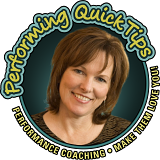Performance Coaching
Why I Do It
Short answer:
It’s rewarding. It’s fun. I have the knack for it.
But most importantly, in 1985, when I decided to “go pro,” feedback from a coach like me would have been a great help!
Long answer:
You could call me an evangelist when it comes to performance coaching. It all began one day at Prairie Music Week in 2000. Two events woke me up to the fact that music performance education was the missing link in our industry.
The first epiphany happened at an amazing drum workshop given by Mitch Dorge (Winnipeg) and Hal Shrenk (Saskatoon). For these guys drumming wasn’t just about producing rhythm; it was about communicating on an emotional level with each other and the audience. Both men could clearly articulate what they were doing as performers. They spoke in passionate detail about using their instruments to make art happen. They weren’t just drummers but two exceptionally self-aware individuals, each acutely aware of what the other was doing and how they were creating visual and musical excitement. They elevated the experience from being a mere workshop to a great, albeit short, show.
I’ve always analyzed myself and other performers, but something crystallized for me that afternoon. Having attended many music industry conferences in Saskatchewan and Toronto, it occurred to me that something important had been missing from all of them. While they covered the song writing and selling business well, they never offered any workshops or panels on the art of developing a live show.
My second epiphany occurred at the awards show that evening. Only in its second year, the producers did well: a terrific stage set, great lighting, exceptional sound, amazing music, short and entertaining acceptance speeches and a charming, witty, well-spoken emcee. That said, I couldn’t help but notice that after their songs, most of the performers didn’t bow or acknowledge the audience in any other significant way. They tended to connect with us by virtue of the volume of their music, but passed up other opportunities to have an impact, or connect with us human to human.
One performance in particular — a spectacular ballad in a country vein that had me literally in tears — was marred at the end. The audience had exploded in appreciation for the young singer, who’d been perched on a stool. No doubt she felt rushed by the tight schedule, but while the theatrical focus was still on her, she descended rather awkwardly from her stool and dribbled off stage as if there weren’t two thousand people out there close to giving her a standing ovation. I was stunned. I had to ask myself, would Reba McIntire have done that? No way.
This singer was already signed to a major label. I assume she had a manager. Why hadn’t she been coached to prepare for such a big event?
So, why do I coach? Because I believe our industry can do better. We have a lot of talent here in Saskatchewan and “the West”; we have people who deserve to be heard and seen internationally. But many of us have an “aw shucks” attitude about our talent, instead of seeing ourselves as having “star potential.” It’s that potential I want to tap as I help musicians develop into the best performers they can be.
